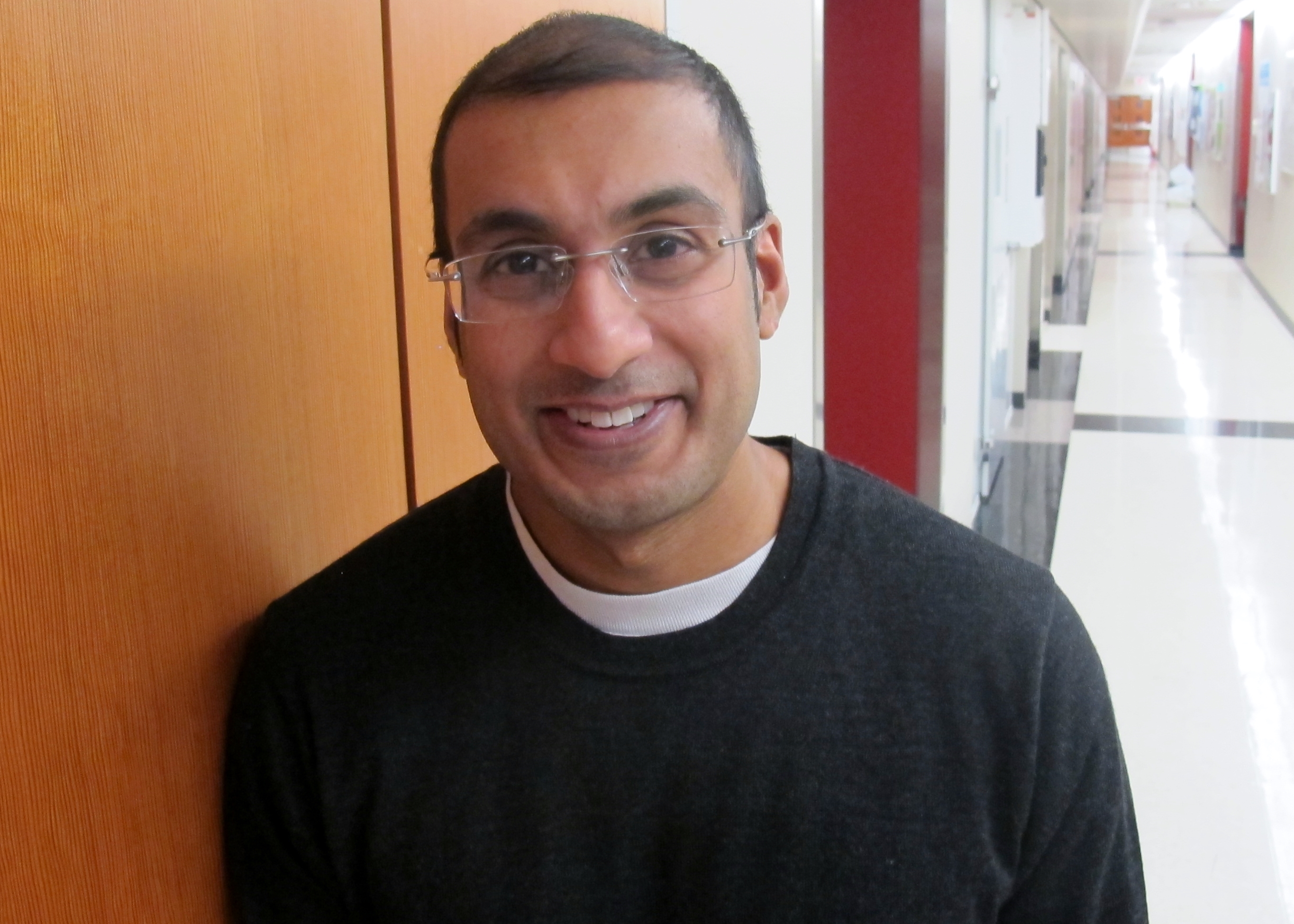
Gopi Sutendra, recipient of the Heart and Stroke Foundation's 2018 McDonald Scholarship.
Chemotherapy can be an effective cancer treatment, but the aggressive attack on cancer cells may cause damage to other cells throughout the body, including the heart. Gopi (Gopinath) Sutendra, '12 PhD, Alberta Innovates Translational Health Chair in Cardio-Oncology, aims to increase the rate of survival and long-term cardiovascular health of cancer patients.
The assistant professor's research could open the door for individually tailored precision health approaches and has earned him the 2018 Heart and Stroke Foundation's McDonald Scholarship. Awarded annually to the highest-rated applicant in the New Investigator competition, the McDonald Scholarship comes just one a year after fellow UAlberta colleague Glen Jickling was named the Heart & Stroke Foundation's Barnett Scholar.
Sutendra says that cardiovascular research is increasingly recognized as area of excellence at the University of Alberta thanks to an increase in interdisciplinary collaboration.
"Twenty-five years ago, you would never see cardiologists and oncologists teaming up," Sutendra said. "People are gaining an appreciation for each other's expertise, so it's really the perfect environment to tackle some of these big problems that might not be possible in some other institutions."
Learn more about Sutendra's research in the Q & A below.
Q: What is your research focus?
We're looking at chemotherapy induced cardiotoxicity, or heart damage that occurs during cancer treatment, which is a major cause of complications and mortality. Although chemotherapies may be beneficial against tumours, they contribute to cardiac dysfunction-meaning they're more likely to develop cardiovascular diseases, either during treatment or even many years after their cancer treatment. Although it is generally well accepted that certain chemotherapy agents can directly damage the heart, it remains unknown if the tumour itself can signal the heart to be more susceptible to chemotherapy agents, and this is an active part of our research program.
Our research program is very timely, because we're noticing that the survival of cancer patients is improving drastically, but many of them develop heart problems at a higher rate than the general population, so a better understanding of cancer and heart health is needed.
Q: Are you working with a specific type of cancer?
At the moment we're looking at all types of cancer, including lung, breast and brain cancers. We think that this theory of cancer mediated susceptibility of the heart is prevalent in many types of tumours. What complicates things further is that even a similar tumour type could have completely different signaling. For example, you could have two patients with lung tumours, but they aren't the same because of specific genetic variations within each tumour type. So you may have ten different patients with lung cancers, but each of them will have a different response to therapy and different tumour secreted factors that could potentially affect the heart. That's why finding specific biomarkers that could affect the heart could lead to a more personalized and effective treatment plan.
Q: Are you planning any clinical trials?
Not yet. This is a research area that people are just starting to appreciate, but what we have found is that there are drugs in early phase clinical trials for other diseases that could also be beneficial in chemotherapy induced cardiac apoptosis, or heart cell death. When we give these treatments to mice, we were able to completely prevent chemotherapy induced cardiac dysfunction. We were also able to enhance the tumour regression with the standard chemotherapy, so their tumours shrunk at a much faster rate than standard chemotherapy, while at the same time, their hearts were completely protected from the adverse effect of the same chemotherapy. Thus, we are finding some novel pathways that can be targeted, and we are gaining more scientific knowledge about how to potentially tackle this emerging problem.
The beauty of our work is that we think that there could be a quicker transition if our findings move to clinical trials because many of these drugs are already being tried in early-phase clinical trials for other diseases.
Q:How do you think this research will impact the way cancers are treated?
What we're starting to realize is that some patients will get chemotherapy and their heart function is completely fine, but others will get the same chemotherapy and they'll develop heart failure, and we don't know why. We have some preliminary evidence to suggest that different tumours secrete different compounds that may make some patients more susceptible, but we don't know what triggers this.
In the ideal world, a patient with cancer would come in and we would be able to to find a biomarker in their system that negatively affects the heart, and we could put them on adjuvant therapy to prevent this negative effect during chemotherapy.
Chemotherapy can cause cell death in the body resulting in side effects-- patients may get nauseous if the chemotherapy kills cells in their gut lining or lose their hair if the chemotherapy kills the hair follicles. But those cells are constantly being renewed, so once you stop the chemotherapy, they can recover. But we have a finite number of heart cells and they replicate at a very, very slow rate, so when you lose those heart cells, you can't recover from that. Finding biomarkers that would help identify which patients would be more susceptible to an adverse effect of the chemotherapy would greatly improve our ability to treat these patients.
Q: What does the McDonald scholarship signify for you?
It signifies an appreciation for this type of work. This is an emerging clinical issue that we need to better understand, and knowing that our scientific peers acknowledge and support it is really encouraging. We're grateful because it comes with some additional funds that we can put towards something extra for this research program, but in the long run it shows that there is value in what we're doing and overall support for this type of research. So that's really meaningful.